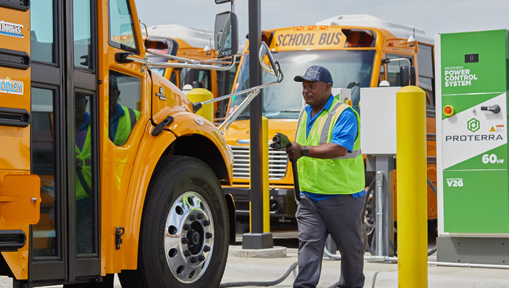DIESEL FUEL
When developing your school bus game plan, it’s important to keep in mind that diesel is a remarkably clean fuel, even though it’s sometimes perceived as less clean than other fuels. Diesel engine technology is also extremely cost-effective and can decrease the total cost of school bus ownership.
Download our Diesel Thomas Built Buses Fact Sheet below.
Diesel has come a long way in the last 25 years.
Click each fact to learn more.
1 gallon of diesel has 113% of the energy of one gallon of gasoline.
Diesel engines are built for the long haul. They can go up to 45,000 before needing an oil change and up to 225,000 before needing a filter change.
All engines today have emissions that are well below federal emissions standards.
- Even though CO2 is not monitored by the EPA, it is still a greenhouse gas. Over the lifetime of the bus, diesel engines emit less CO2 than propane or gasoline engines.
- All our current engines emit 90% less emissions compared to 2006.
All engines currently meet or exceed EPA emissions regulations.
With further emissions improvements on the horizon, Thomas Built Buses exceeded the EPA greenhouse and gas standards for 2021 in:
- Particulate Matter
- Hydrocarbon Emissions
- Carbon Dioxide Emissions
Based on EPA regulated emissions, diesel is comparable or even cleaner than other fuel types.
Diesel has the lowest carbon monoxide emissions of any type of fuel. It also has the lowest carbon footprint over the operational life of the vehicle.
Alternative fuel engines are not always the cleanest.
EPA regulated emissions, diesel is comparable or even cleaner than other fuel types. Diesel also provides the safest, least combustible, most reliable power.
Partner with Hoekstra
We can help you from start to finish and well beyond!
- Provides Diesel School Bus
- Long & Short Term Support
- Grant Writing
- Driver Training
- Technician Training
- Structure & Installation
Begin Your Days With Diesel
We’re here when you’re ready to add deisel vehicles to your fleet! Partner with Hoekstra Transportation for a consultative approach to purchasing your new deisel vehicle. We’ll guide you through the most frequently asked questions, customization options, as well as leasing and fleet solutions to help you make the most informed choice.ce.
Recent News






 HOEKSTRA FAMILY OF COMPANIES
HOEKSTRA FAMILY OF COMPANIES

